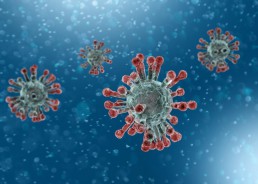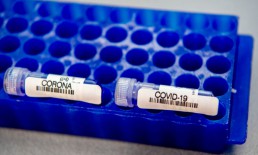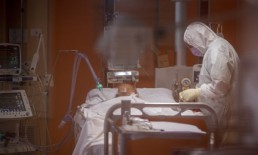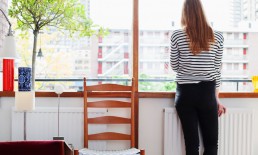Coronavirus disease (COVID-19) and CLL patients
Coronavirus disease (COVID-19) and CLL patients
CLL Advocates Network is closely monitoring the strategies being implemented in various countries to manage the COVID-19 virus. Much of the information about COVID-19 does not address the concerns of people with chronic lymphocytic leukaemia (CLL). With this statement, we wish to fill this gap and provide extra advice for CLL patients.
The squeeze on healthcare in locked-down New Zealand
The squeeze on healthcare in locked-down New Zealand
Medical centres across the country are condensing services, moving online and ushering in pandemic plans. Josie Adams assesses what it’s like to access and provide essential medical care under alert level four.
On Monday, Sandra Russell woke up before dawn and drove to Milford to get her blood tested. She has an incurable blood cancer, myeloma, and needs weekly tests to see if the injections she gives herself are working to build her immune system. If she contracts Covid-19 now, it could kill her.
She has a poor immune system, so is used to self-isolating. “I’ve had two stem cell transplants, and you have to isolate yourself for six months afterwards,” she said. “I’m not going anywhere, but the one place I have to go is Labtests.”
Her usual centre is Devonport, but under alert level four she must go to Milford. She drove in the dark to join a line that was already growing. Inside the clinic, paper towels marked with Xs dotted every odd seat, so patients would maintain physical distance. When it was Russell’s turn, she was ecstatic to see her usually Devonport-based phlebotomist, who told her she’d had to buy her own face mask.
PPE not necessary
A release from Labtests last week stated that in order to protect the health of its phlebotomists, it would turn away patients with respiratory or feverish symptoms. When Russell attended the clinic on Monday, a young woman stood at the door screening patients with two questions: had they left the country in the past fortnight, and did they have any symptoms of Covid-19? She was employed by a security company, and was not medical staff. Russell saw her handed a jacket and t-shirt to wear during her shift, not a mask or gloves.
When approached, Labtests did not comment on specifics about its alert level four practices, but stated it had activated a pandemic plan that included limitations on the number of collection centres remaining open. In the statement, it said:
“There are a number of considerations with collection centre closures, including our ability to maintain safe staffing levels with the available personnel, our ability to operate in compliance with the requirements applicable during alert level four (such as physical distancing) and distribution of collection centres across the three Auckland DHB regions,” said a spokesperson. “The situation is developing rapidly and service levels are continually monitored.”
Labtests’ policies regarding personal protective equipment (PPE) are in line with current government guidelines.
According to the Labtests website, only 18 of its 60 Auckland clinics remain open. This is expected; many medical services are condensing or closing their services throughout lockdown, as only essential medical care will be provided face-to-face. For those with ongoing needs, blood testing will be available throughout alert level four. Home visits are only available to those with “urgent need“.
STIs going unchecked
Family Planning is one business that has turned off the lights in its premises nationwide.
Rose Stewart, national nurse advisor at Family Planning, said that although clinics are physically closed, staff are still working. Phone consults are available, and patients can book in for one via the website.
Stewart said many services were still accessible. “We can fax through prescriptions, and we can offer doctor’s consults,” she said. “You can still access abortions, too.” This was a major fear for many, but Stewart confirmed hospitals are still performing terminations where required and Family Planning is still providing information to patients.
One thing Family Planning is unable to do during alert level four is offer shots. “If you have gonorrhoea, we can’t treat you,” said Stewart. (In most cases, gonorrhoea is treated with a single injection of an antibiotic and a dose of tablets.) “But people probably aren’t spreading that right now.”
You might not know you have an STI; Labtests is focusing on Covid-19 samples, so if you’ve had a routine check for an STI recently it likely hasn’t been processed. However, if you have obvious symptoms you can still receive treatment. “We can treat chlamydia right now,” said Stewart. The symptoms are easily recognised and the treatment is antibiotics by prescription.
Those with IUDs, implants, and depo provera shots about to expire will also have to wait until the alert level decreases to get these updated by Family Planning. “If you are due for your depo provera jab or for your implant to be changed, we will give you a prescription for the pill until we’re able to do face-to-face appointments again,” said Stewart.
Jane Morgan of the Waikato Hospital Sexual Health Service said New Zealand was facing a syphilis epidemic when alert level four occurred, and medical services were still committed to treating STIs during this period. Syphilis is a destructive, eventually lethal infection, and its symptoms can take up to three months to show up. “Not everyone gets symptoms,” said Morgan. “We are still able to do syphilis blood tests for anyone with symptoms that suggest
Morgan said sexual health clinics and GPs would continue to offer services requiring face-to-face consults during this time, including gonorrhoea treatment and depo provera injections.
Not-so-general practice
The government has, more broadly, been directing healthcare providers to narrow their focus onto Covid-19. Three of Tāmaki Healthcare’s clinics — Airport Oaks, Henderson Specialist Centre, and St Lukes White Cross — are all now dedicated to testing for Covid-19.
FlexiHubs, discussed briefly in Friday’s press conference with director-general of health Dr Ashley Bloomfield, are being rolled out in greater numbers. These are clinics that will triage patients and test for Covid-19 away from the main medical centre, so patients with non-Covid-19 essential needs can be seen in relative safety.
Dr Alistair Sullivan, the director of Urgent Care Tāmaki Health, said that although they were redirecting resources to combating Covid-19, keeping things essential-only was affecting operation. “Attendance numbers are down by 50-60%,” he said. “We have consolidated our clinic operations by closing a small number of sites.”
The government has just announced $30 million in funding for GPs and pharmacies, to support management of the Covid-19 workload and community-based assessment centres. This came just as the Royal New Zealand College of General Practitioners announced GPs are a workforce in crisis.
“Financial assistance for general practice and urgent care clinics is necessary in order to protect the availability of primary health services now, and for the future,” said Sullivan. “Together we ensure that patients get the medical care they need close to their homes, and that our hospital system is free to deal with more serious medical presentations.”
Originally published on The Spinoff
How COVID-19 is Impacting Patients with Chronic Lymphocytic Leukemia
How COVID-19 is Impacting Patients with Chronic Lymphocytic Leukemia
As the new coronavirus (COVID-19) continues to spread around the world, concerns about how the virus impacts patients with cancer are mounting, making virtual connections between experts and patients a vital component of staying healthy.
To facilitate these connections, the CLL Society, a nonprofit organization focused on patient education, support and research, recently hosted part one of a virtual community meeting series where patients with chronic lymphocytic leukemia (CLL) spoke directly with experts about every aspect of the disease, from medication to clinical care and beyond, and how to get the best care possible during the pandemic.
Held via webinar on March 27, the meeting was designed to provide a link between patient questions and the CLL Society’s panel of experts, according to Patricia Koffman, co-founder and executive director of the organization. Dr. Brian Koffman, CLL Society co-founder, executive vice president and chief medical officer, who is also a 15-year CLL survivor, served as moderator, and was joined by a panel of experts from Lumere Healthcare Solutions, the University of Massachusetts, Memorial Sloan Kettering Cancer Center and Duke Cancer Institute.
Thomas E. Henry III, a clinical pharmacy advisor with Lumere and patient with CLL, kicked off the discussion with news about the CLL drug supply in the United States, as well as information on how patients can stay on top of their maintenance medication supply during the pandemic.
According to Henry, at the time of the presentation, the Federal Drug Administration reported no shortages for any commonly used CLL medications, including Imbruvica (ibrutinib), Calquence (acalabrutinib), Venclexta (venetoclax), Rituxan (rituximab) and others.
Although China is a major supplier of medications used in the US, the interruptions in production that occurred in certain regions due to the COVID-19 outbreak there did not impact US supplies and normal production is being resumed as the number of cases in China drop, Henry said. This has led to legislators considering new rules that would require more drugs to be made in the US.
As for how patients with CLL can ensure they don’t experience any gaps in dosage, Henry provided some strategies, including early refills and working with health care teams to modify dosages.
“A lot of people don’t know that your insurance will pay for a refill once you use 75% of the doses that were prescribed,” he said. “So, if you have ibrutinib, for example, and you have the 28-day supply, you can actually order that on the 21st or 22nd day and start to stockpile a little that way.”
This also applies to maintenance medications that help to mitigate CLL comorbidities. “Comorbidities increase the risk for patients that may contract COVID-19,” Henry explained.
“I think that patients need to be proactive and order their medications early. Don’t wait until you’ve taken your last pill to call the pharmacy.”
Susan J. Leclair, Chancellor Professor Emerita, University of Massachusetts and senior scientist with Forensic DNA Associates, LLC, then discussed the COVID-19 testing process and offered tips on how patients can modify their daily activities to stay safe from the virus.
“There’s a lot of stuff on the web right now about using various home chemicals to clean things,” said Leclair. “You can use alcohol, but you have to use alcohol that’s over 62%. So, unfortunately, unless you have a still in the backyard, and you can control this, using booze isn’t going to work. It’s too low.”
Dr. Anthony Mato, director of the CLL Program at Memorial Sloan Kettering Cancer Center, and Dr. Danielle M. Brander, associate professor of medicine at Duke Cancer Institute,
then fielded questions from the audience on topics like clinical trial participation and personal risk.
In the case of patients who are currently enrolled in clinical trials, Mato explained, participation should be continued wherever possible.
“Clinical trials are such an important part of the care of patients with CLL,” said Mato. “My stance has been that it is not in the best interest of patients to stop treatment in the context of a clinical trial, largely because we feel that the crisis with COVID-19 will pass and yet the CLL will still be present following that crisis, and so it is our duty to try and control the disease as best as possible.”
To reduce risk and exposure to COVID-19, Mato said, he and his colleagues work with patients on an individual basis to minimize the number of cancer center visits patients may need in the context of their trial. “We are largely switching to telemedicine visits, trying to do home labs and even shipping study drugs to patients. And we’re doing that on a large-scale basis within our CLL program,” he said.
Brander added that patients with CLL may be concerned about being at a higher risk of contracting COVID-19, and that she and her team are working with patients on an individual basis to help manage those concerns.
“The difficulty now, when you’re looking at (current COVID-19) studies, is bringing together a very diverse group of patients,” she said. “Their cancer might have been in a different location that kind of makes sense. (For example), lung cancer patients with active treatment, or recent surgeries are going to be very different maybe than patients with CLL. So, like Anthony (Mato) mentioned, this is why we’re trying to minimize your exposure with clinic visits.”
Covid 19 coronavirus: Pharmac eases restrictions on cancer drugs during Covid-19 pandemic
Covid 19 coronavirus: Pharmac eases restrictions on cancer drugs during Covid-19 pandemic
Pharmac will ease restrictions on at least nine cancer drugs, including keytruda for the treatment of advanced melanoma, to reduce hospital visits and cut the risk of highly vulnerable patients catching Covid-19.
One senior oncologist has praised the drug buying agency’s swift response, although patient advocates say cancer sufferers will need much more help during the pandemic.
Groups representing cancer patients are worried that the Givealittle pages many rely on to pay for medicines not funded by Pharmac won’t be supported in an economic downturn.
They also worry that if the health system becomes overloaded and ethical decisions have to be made about rationing ventilators then those with advanced cancer may not get access to them.
Some patients are already talking to their oncologists about whether they should pursue treatment at all – because some procedures, such as bone marrow transplants, heavily suppress the immune system and a Covid-19 infection may be a greater risk than stopping the treatment.
From this week Pharmac will make its first moves to help cancer patients in the pandemic by removing restrictions on keytruda, which is publicly funded for advanced melanoma, although not for lung cancer.
Oncologists will be able to give patients higher doses of keytruda, less frequently, in a bid to reduce hospital visits.
They will also ease testing requirements in order to free up access to at least eight other cancer drugs used to treat a range of conditions including prostate, breast and lung cancer.
Widening access for cancer drugs is part of a broader move by Pharmac to reduce the burden on the hospital system during the pandemic, although the agency will revert back to its previous rules once the crisis is over.
About 200 of the 2000 drugs publicly funded by Pharmac are subject to what is called Special Authority criteria, meaning patients require tests or consultations to get access to them.
Pharmac director of operations Lisa Williams said the agency was going through each of the 200 drugs which have Special Authority restrictions and waiving many of the barriers during the Covid-19 pandemic.
“The aim (is) to ensure that patients can still receive the medicines they need while we’re supporting the isolation principles as much as possible and freeing up resources in the health sector.”
Chris Jackson, a consultant medical oncologist at Dunedin Hospital, said Pharmac had been swift and agile responding to Covid-19, which poses a greater risk to the cancer patients he treats.
An analysis of Chinese data just published in The Lancet estimates people with cancer have 3.5 times the risk of suffering a severe Covid-19 infection.
“It’s really important to note that the health system at present is not overwhelmed in terms of its capacity and that means that all people who need cancer treatment will get their cancer treatment,” Jackson said.
But for those whose treatments heavily suppressed the immune system, such as bone marrow transplants, doctors would be talking to patients about whether that should go ahead given the risks of Covid-19.
“If we get to a level where we’ve got high rates of Covid infection in the community, we would seriously think very carefully about the balance of risks and benefits in individual patients,” Dr Jackson said.
“Because a lot of what we do, you can’t just turn off – it does take some time to wash out and as we have seen this epidemic can spread extraordinarily quickly.”
Another layer of risk was added for patients over 80. “If they get it and if you add a deeply immune-suppressing therapy to that then the balance of risks and benefits may tip against therapy. But that will be a discussion had with each individual patient.”
Malcolm Mulholland, spokesperson for Patient Voice Aotearoa, said there were a range of issues cancer patients were concerned about during the pandemic – including paying for drugs not funded by Pharmac.
Mulholland, whose wife Wiki Mullholland was diagnosed with Stage 4 breast cancer in 2018, said there were about 5000 Givealittle pages requesting money for medicines.
“It is, in effect, a de facto system being run because Pharmac is inadequately funded. That is a real fear amongst our community and quite simply, if these people don’t receive the medications they need, they will die.”
Philippa Reed, chief executive of Sweet Louise, which supports about 700 women with incurable breast cancer, said the charity had just launched an urgent appeal but fundraising was difficult during a lockdown.
“The kinds of community events that we may have had, have been cancelled. Any form of fundraising event, like most events, just isn’t happening.”
Reed also said members were worried after one was told by her oncologist that she may not get access to a ventilator in a situation where the health service became overwhelmed.
“Clearly New Zealand hasn’t got to that stage yet and so I think that was absolutely someone getting ahead of themselves. But with a particularly vulnerable community it’s really important not to drop your compassion and I think that was an example of just thoughtlessness.”
Jackson said patients with curable cancer who contracted Covid-19 should get the same care as anyone else.
Things may be different for those with advanced cancer who were approaching the end of their life.
“If you then get a Covid infection on top of that, which is severe and causing pneumonitis, it may well be that going on to a ventilator is an undignified death for those people.”
Jackson said ultimately patient rights and autonomy had to be respected.
“I’ve heard no conversations at all anywhere that said whole groups of people should not get ventilators. I have not heard anybody suggest that and I think anyone who made those broad brush types of statements would be seriously misguided.”
‘It is daunting to be told how personally dangerous coronavirus is’
‘It is daunting to be told how personally dangerous coronavirus is’
This story is behind a paywall, however if you have access or sign up for a free trial you’ll be able to read the full article by Sam O’Neill, a UK reporter with CLL. Access the full article here: https://www.thetimes.co.uk/article/coronavirus-it-is-daunting-to-be-told-how-personally-dangerous-this-virus-is-7qbfqxl9k
I have never before considered myself to be a vulnerable person. As a reporter, much of my work has been about highlighting the plight of the vulnerable.
Today, however, I expect a letter from the NHS telling me that I am “extremely vulnerable” if I contract Covid-19. It will tell me to stay at home for at least 12 weeks and will be followed periodically with text messages giving advice and information. I am part of the group with what are so often blandly referred to as “underlying health conditions”. My problem is chronic lymphocytic leukaemia (CLL), which means my body makes too many white blood cells. Left unchecked these will crowd out the red cells and threaten vital organs.
Coronavirus: how Asian countries acted while the west dithered
Coronavirus: how Asian countries acted while the west dithered
The first coronavirus cases in Taiwan and Italy came only 10 days apart. On Sunday Taiwan, which has deep cultural and economic ties to China, has recorded just 153 cases and two deaths. Italy has more than 47,000 cases and 4,032 people have died.
Italy’s epidemic is currently the most devastating in the world; its death toll overtook China’s last week and on Saturday officials in Lombardy said deaths in that region had jumped by 546 in one day to 3,095. The pattern of an exponential explosion in cases, after weeks of government inaction in the face of impending crisis, has been repeated across western countries from Spain, France and Germany, to the UK and the US.
Leaders are now taking measures that would have been unthinkable weeks or even days ago, locking down tens of millions of people from Berlin to Madrid and San Francisco and pouring billions into rescue plans.
But had they acted a few weeks earlier, they could perhaps have avoided much of the human tragedy and economic catastrophe they now face. Taiwan, Hong Kong and Singapore, which had their first confirmed cases before Europe, but acted early and fast, still have deaths in single digits and, at most, a few hundred cases.
Taiwan, helped perhaps by having an epidemiologist as vice-president, started tracing passengers from Wuhan as soon as China warned of a new type of pneumonia in the city last December, before Covid-19 was identified. Social distancing, ramped-up testing and contact-tracing followed soon after.
Most western countries did little, apart from developing a modest testing capacity – apparently gambling on the disease being contained elsewhere, as previous threatened epidemics, including Sars in 2002-03 and more recently Ebola and Mers, had been.
“The challenge faced by government is whether and when to act on a health threat. If you act swiftly and the outbreak isn’t as bad as feared, then government gets criticised for overreacting. If you adopt a wait-and-see approach and move too slowly, then government gets criticised for underreacting,” says Steve Taylor, professor at the University of British Columbia and author of The Psychology of Pandemics.
“In hindsight, the UK might have been better off if they had adopted the same practices as Taiwan. But if the outbreak had fizzled, the government would have been criticised for overreacting. Taiwan gambled successfully on the assumption that Covid-19 would spread widely and rapidly.”
Other countries that initially allowed the disease to spread – most notably South Korea, which at one point was the country with the most infections outside China – managed to partially tame the outbreak through rigorous testing and tracing contacts of those infected. Subsequently, new infections levelled off, even as they spiralled across Europe.
“I do think we can learn from past mistakes, and South Korea is a really strong example of that if you look at the amount of testing they have been doing, and how fast they were able to mobilise,” said Ashley Arabasadi, chair emeritus of the Global Health Security Agenda Consortium.
“It might be unfair to criticise governments that haven’t had to deal with something like this in over 100 years, while South Korea have had more recent experience.”
South Korea’s sense of urgency was driven in part by recent firsthand experience of how virulent coronaviruses can be due to an outbreak of Mers in 2015 and the 2002-03 Sars epidemic, which also affected Taiwan, Hong Kong and others in the region.
Those diseases barely touched the west, being contained, like others including Ebola, near the site of their outbreak, potentially leaving the west’s leaders too complacent.
“We should have used that time [in January and February] more wisely, but, to be fair, everyone was dealing with an unknown,” said Laura Spinney, a science journalist whose latest book is Pale Rider: The Spanish Flu of 1918 and How it Changed the World. Authorities didn’t want to cause panic initially, she said, but then the balance shifted so “the biggest danger was not panic – it was complacency, and too many governments weren’t moving”.
There is a chance some politicians in the US and Europe, lulled by decades of stability in their countries after the second world war – decades in which they have waged war overseas but never seen life totally upended at home – simply didn’t want to recognise the threat.
“People are not terribly good at estimating risk. Wishful thinking, overestimation of resources, and other factors can cloud our judgment of risk. This may have happened during the current pandemic,” Taylor said.
It’s important, however, that whenever the world does successfully develop a vaccine, or a cure for Covid-19, the tragic lessons of these early crises are not forgotten. Governments need to invest in healthcare systems, so that when the next pandemic arrives, we are better prepared.
“You see a system of panic and response that we go into. Once that initial panic dies down, you get complacency, a lack of understanding that these novel viruses happen regularly and will happen with greater frequency as we become more interconnected,” said Arabasadi. “That’s why there needs to be a greater investment in health and health systems.”
Originally published on The Guardian
Coronavirus in NZ: How to self-isolate - Kiwi diagnosed with cancer shares advice
Coronavirus in NZ: How to self-isolate - Kiwi diagnosed with cancer shares advice
A Kiwi diagnosed with cancer has shared advice on how to self-isolate while living with others and what precautions immunocompromised people should take.
The Government has announced that people travelling into New Zealand, except from the Pacific Islands, have to self-isolate for 14 days.
This has sparked many questions on how self-isolation works and how to deal with it when more than one person lives in a home.
Auckland man, Earle Wilco, 44, moved to Island Bay, Wellington, from Shanghai when he was diagnosed with chronic lymphocytic leukaemia (CLL) last December.
“Mid-cycle, my immune system drops and I become very susceptible to infections, colds and flu,” he said.
He has had to self-isolate during these times while living with his friend and his two children, aged 11 and 14.
After seeing a friend in Wellington seeking advice on how self-isolation works, Wilco has shared his knowledge through his own experiences, which also includes self-isolation during a norovirus outbreak in 2005.
“Self-isolating in a house share is particularly tricky, but it can be done if all the housemates pull together,” he said.
“My suggestion for someone returning from overseas who has to self-isolate in a house share situation is this:
“1. Inform everyone of your arrival time so they can clean the house. Make it clear that you’ll need help with food shopping and even cooking sometimes, set up bank transfers with all housemates so you can pay them if you ask them to buy you stuff. Set up a special house WhatsApp group chat.
“2. Once home, stay in your room as much as possible. If there’s more than one bathroom in the house, have one dedicated only to you, this will remove a lot of cross-contamination potential. Likewise, keep your own sheets, towels and cutlery separately. (If you can’t have a dedicated bathroom, make sure you wipe down all surfaces with disinfectant after you use it).
“3. If you have to be out of your room when others are around, wear a mask, wash your hands, and wipe down surfaces that you touch.
“4. Food can be delivered to your bedroom door. They knock, walk away, you retrieve it.
“5. Make sure you have a digital thermometer, and check your temperature regularly. If it gets above 37.5, call your GP or after-hours clinic, outline your situation and wait for advice.”
Wilco’s advice is very similar to the advice given by the Ministry of Health and other disease experts including University of Otago epidemiologist Professor Michael Baker.
“It’s not home detention – people can wander around the streets and get some exercise. The thing is about not infecting other people if you might be in the early stages of incubating this infection,” Baker previously told the Herald.
During his chemo self-isolation periods, Wilco said he follows all these guidelines along with more.
“I try to time cooking and using shared spaces when everyone is out,” he said.
“This is as much for my safety as the safety of my housemates, as when you’re doing chemo, you’re awash with toxic chemicals which come out in your body waste.”
Wilco said the precautions he is taking now because of the Covid-19 outbreak are the same as he uses when his immune system is low.
This includes limiting travel, staying away from groups of people, sticking to his room whenever possible, eating healthy, washing hands frequently and keeping his distance with others.
Meanwhile, Wilco said he hasn’t had any problem with Covid-19 as he left China before the outbreak. However, his wife is stuck in China.
“She went back to Anhui Province for Chinese New Year and got caught there with the city lockdowns, so she was in quarantine for about 50 days, only allowed to leave the house once a day for supplies,” he said.
“She has just got back to Shanghai last week and has to self-isolate for another 14 days.
“We also have a lot of friends in Wuhan, so we get lots of information and advice. The stories are frankly heartbreaking.”
His last piece of advice was for people not to panic.
“It is a pandemic and it is taking lives, it needs to be taken seriously, so the best thing people can do is limit close personal interactions and practice good hygiene.”
Immunocompromised precautions
According to the Ministry of Health, those who are underlying medical conditions, such as a compromised immune system, liver disease, cancer, kidney disease, heart disease and diabetes mellitus, need to take more precautions to protect themselves from Covid-19.
It recommends immunocompromised people to take the following simple steps to protect yourself and others:
• Avoid close contact with people with cold or flu-like illnesses.
• Cover coughs and sneezes with disposable tissues or clothing.
• Wash hands for at least 20 seconds with water and soap and dry them thoroughly:
– before eating or handling food
– after using the toilet
– after coughing, sneezing, blowing your nose or wiping children’s noses
– after caring for sick people.
There are also additional measures that immunocompromised people should take:
• Avoid staying with a person who is self-isolating (because they are a close contact of a confirmed case of Covid-19 or have recently travelled to any country except those listed in the countries and areas of concern under Category 2.)
• Stay at least 2 metres away from people who are unwell.
• Checking safe travel advice about Covid-19 if you plan overseas travel.
• Those who take immunosuppressive drugs we advise that you do not stop this medication without first consulting your GP or specialist.
Originally published on the New Zealand Herald
Coronavirus: how to self-isolate
Coronavirus: how to self-isolate
What to do if you have symptoms of Covid-19, have travelled to a badly affected area, or have been in contact with someone who has the disease.
1. Stay at home
This may sound obvious, but don’t leave home except to get medical care (and if you do, make sure you have called ahead). Say no to visitors. Contact friends and family online or by phone. If you use online shopping for deliveries of food, medicine or other necessities, make sure delivery instructions say that items should be left outside, not handed over in person. If you ask friends or family for help bringing you supplies, get them to do the same.
2. Separate yourself from others
Stay in one room, with the door closed – ideally a room that has a window to the outside that you can open. Don’t share crockery, cutlery, glasses, bedding or towels with anyone in your home when you have used them. Dishwashers can be used to clean crockery and cutlery. If that isn’t possible, wash by hand and dry using a separate tea towel. Laundry, bedding and towels should be placed in a plastic bag and washed only when tests for Covid-19 are negative or self-isolation is over, if possible. Do not take anything to a launderette. If you have to wash at home, use temperatures of at least 60C.
3. Food and bathrooms
Have meals left outside your door. If you cook for yourself, do so, if possible, when others are not in the kitchen – and take food back to your room to eat. If you have more than one bathroom in your home, use a separate one. If you have to share, ensure you clean it thoroughly and regularly. If you live in shared accommodation (such as university halls of residence), leave your room only when necessary, ideally wearing a mask, if you have one. Try to avoid using the kitchen or bathroom while others are there.
4. Keep away from pets if possible
Wash your hands before and after contact as a precautionary measure.
5. Safely dispose of tissues after you cough or sneeze
Dispose of them into a plastic bag and immediately wash your hands with soap and water, and dry thoroughly. If you have one, wear a mask when you are in the same room as others, or if you go out for medical treatment.
6. Hand washing
The rules are similar to those for all people – wash your hands often and thoroughly, using soap and water, for 20 seconds Then rinse and dry thoroughly. Avoid touching your eyes, nose and mouth with unwashed hands.
7. Waste disposal
All waste that you have been in contact with, including used tissues and masks, should be put in a plastic rubbish bag and tied when full. The plastic bag should then be placed in a second bin bag and tied. Do not dispose of it or put it out for collection until you have test results, or until quarantine is over. If you test positive, you will get instructions on how to dispose of the waste.
8. If symptoms worsen
Seek medical help quickly if you develop new symptoms or if your symptoms worsen (for example, if you have problems breathing).
COVID-19 and CLL
COVID-19 and CLL
This article was originally published on CLL Society
We are receiving many requests to suggest any special precautions for us, CLL patients, in response to the spreading risk of coronavirus (COVID-19).
First, this is an evolving situation with more unknowns than knowns at the present time.
Second, it does appear that those over 60 years old are at increased risk for a more serious infection. That would include many of us CLL-ers.
Next, those who are immune suppressed (and all CLL patients, whether treated or not, are immune suppressed) are at a higher risk for serious disease, but perhaps there is less of an increased risk for us than for those with heart or lung conditions. There is almost no data out there to provide clarity on this important issue.
There is also no clarity as to whether we are at higher risk to acquire the infection, only that we are more likely to have a rough time if we do get it. So far it does not appear that we are at higher risk to become infected, but again there is just too little information to be certain at this time.
The prudent course of action is to follow the CDC and WHO guidelines that, besides hand washing, elbow bumps, avoid touching your eyes, nose, and mouth, cleaning and disinfecting frequently touched objects and surfaces, and more, now the CDC advises high risk folks like us to avoid travel and crowds. This was a change as of March 5, 2020.
In a proactive and cautionary move, the CLL Society canceled all Support Group meetings and Patient Educational Forums scheduled for March. Soon after announcing this, LLS and LRF canceled meetings as well.
For general information from the CDC, please see: https://www.cdc.gov/coronavirus/2019-ncov/about/index.html and for high-risk populations, including CLL patients, see: https://www.cdc.gov/coronavirus/2019-ncov/specific-groups/high-risk-complications.htmlI myself have canceled 2 trips for CLL-related education this month.
The CLL Society is closely monitoring the COVID-19 outbreak and will provide updates through the website, and will, when appropriate, through our email list, as soon as more information becomes available. Rather than sending individual emails with your questions, please sign up for our Alerts and check the website for the latest COVID-19 news.







